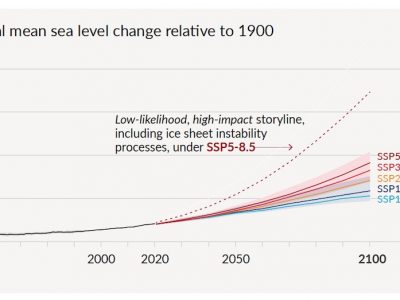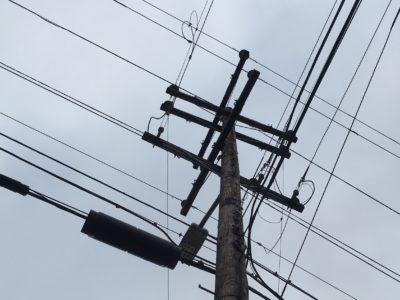The Recall
Here are the replacement candidates' views on climate.
With the California recall election coming up a month from now, it's time to take a look at the candidates. The environment hasn’t been a signature issue for incumbent, Gavin Newsom, but he has strongly supported climate action. Now let’s take a look at who might replace him. It’s hard to know who, out of the scores of candidates, might ultimately emerge from the pack of challengers. Here are the candidates who currently seem to have the greatest chances and t...
CONTINUE READINGHot off the Press: The New IPCC Report
The latest science confirms the need for urgent action.
The IPCC issued the massive first volume of its new report on climate change on Monday. This volume focuses on climate science: how much will the world warm, and what will the impacts be? The bottom line is that the evidence is becoming ever firmer that (a) humans are causing an unprecedented rate of climate change, (b) we are starting to foreclose our ability to achieve less dangerous outcomes, and (c) failure to act will impose tremendous costs for generations. He...
CONTINUE READINGA Sleeper Provision in the Senate Infrastructure Bill
The bill gives the Feds broad authority to authorize transmission projects.
We will need a much more robust transmission in coming years. Sources of renewable energy, such as Iowa wind farms, are often located far from the urban centers that need the power. Transmission also helps to deal with weather issues that may impact renewables: even if it’s too cloudy for solar in one state, the sun may be shining a state or two over. The effort to build new transmission has been stymied, however, by resistance from utilities and state governments. ...
CONTINUE READINGUnintended Consequences Create Challenges for Utility Regulators
Making sure that regulatory incentives do what the regulators intended.
In a new post, Dan Farber mentions performance-based regulation as a promising tool for encouraging energy utilities to be enthusiastic in supporting the transition to clean energy sources. There are a lot of people who agree with him. After all, traditional utility regulation tends to encourage the companies to overspend on infrastructure and under spend on operation and maintenance, while striving for higher sales, because those are the major ways to make a profit. But...
CONTINUE READINGBlue Skies and Wildfire in California
An opinion piece in the NY Times reveals a disconnect between history and what we expect from wildfires and air quality
There’s a lot of news coverage about the wildfires on the West Coast right now, and rightly so. But with that news coverage comes a lot of commentary, some of which might lead us down the wrong policy path. I want to highlight an example from the New York Times opinion page, not because it is the most egregious example, but because the Times is particularly influential with a range of policy and intellectual elites who might take what the piece says seriously. The p...
CONTINUE READINGCarrots and Sticks for Utilities
Utilities control a lot of the power system. How can we get their support for the energy transition?
Investor-owned utilities supply almost three-quarters of U.S. electricity. With some notable exceptions, they’ve tended to drag their feet on the energy transition. In order to push the transition forward, we need to get them on board. This post will try to diagnose the problem and sketch some possible remedies. The proposed Clean Energy Standard is one effort to deal with this problem. I'll explain later how it fits into the analysis. The Problem. Utilities ma...
CONTINUE READINGFull Speed Ahead? Biden Administration Set to Release New CAFE Standards
As E&E News reported today, the Biden administration is expected to announce tomorrow new fuel economy and tailpipe emissions standards for light-duty vehicles model years (MY) 2023 through 2026. The move is long-awaited; one of the Biden administration’s first actions was to direct EPA and NHTSA by executive order to revise the Trump era version of these rules by July of this year. The release of this proposal will miss that deadline by about a week, but the joint...
CONTINUE READINGSpeaking Truth to Corporate Power
Decades ago, industry scientists fought to get their bosses to pay attention to climate change.
Decades ago, their own scientists told car companies and oil companies about climate change, information the companies chose to ignore. The scientists were voices crying out in the corporate wilderness. Sadly, they were ignored at the time, but companies are starting to pay the price for that in lawsuits. Those scientists advocated for the truth, and their stories deserve telling. Let’s start with the car industry. An article in E&E News describes some of ...
CONTINUE READINGProfs. William Boyd and Alex Wang Join Prof. Ted Parson in Emmett Institute Faculty Leadership
Faculty Take on New Roles at Emmett Institute
This month, the Emmett Institute is thrilled to welcome two of our core faculty members, William Boyd and Alex Wang, to new roles at the Institute. Both will serve as faculty co-directors alongside our faculty director Ted Parson. In their new roles, Prof. Wang and Prof. Boyd will help lead the Emmett Institute’s ambitious research, teaching, and public service agenda. William Boyd is Professor of Law and Michael J. Klein Chair in Law at UCLA Law, with a joint a...
CONTINUE READINGOregon Takes a Big Step Forward
New climate legislation sets a high bar for other states.
On Wednesday, Oregon Governor Kate Brown signed a package of four clean energy bills. These bills move Oregon to the forefront of climate action. These laws ban new fossil fuel plants and set aggressive targets for the state’s two major utilities, requiring emission cuts of 80% by 2030, 90% by 2035 and 100% by 2040. This is not only a major step forward for the state; it should also clear the path to closer collaboration among Washington State, Oregon, and Californ...
CONTINUE READING











